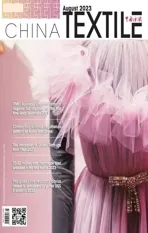Sustainable supply chain provides traceability of a garment
2023-09-18ZhaoXinhua,ZhongMengxia

To meet the growing demand for low-cost clothing,brands have developed supply chains that produce high volumes of synthetic, petroleum-based garments.Therefore,tech-enabled strategies accelerate the shift of fast fashion to a circular economy and closed-loop systems.Startups are introducing environmentally-conscious practices like reuse and recycling.For instance, manufacturers use renewable power sources harvested from the user’s body heat.Further,blockchain-based technologies create transparency, traceability, and accountability in supply chain management.While intelligent algorithms match with approved suppliers,track order’s progress, and manage end-to-end production.
Creating transparency through traceability
Haelixa offers proprietary and innovative solutions that mark products with DNA to verify them along the supply chain through systematic sampling and testing.With their solutions, you will be able to comply with regulations, boost your credibility, brand reputation, and corporate profitability.They set up the traceability with the suppliers you nominate.
Textile value chain sustainability tracker
PaperTale blockchain technology provides traceability of consumer goods in a radically transparent manner, offering science-based impacts to consumers, brands and factories.PaperTale’s system captures the supply chain of a product from cradle to grave, in real-time.By integrating PaperTale into existing ERP and PLM systems, factories and brands can gather and verify the flow of material, and their social and environmental data in real-time.Data is added to a public blockchain so it is extremely hard to tamper with,increasing trust.When a product is finalised, consumers can scan an NFC tag or QR-code to view the entire journey a product has travelled, which craftsmen were part of the production, and if they have been paid by law.By using IoT, we display the environmental impact of a product by showing its water usage, carbon emission,and the impacts of transportation.

Unique end-to-end brand protection solution
MERDAN® with its unique and open services platform, Xiphoo brings the Digital Product Passport to life.We assist manufacturers and brands with scaling sustainability services, managing certificates, protecting their brands, and complying with environmental, social,and governance (ESG) standards.This innovative platform creates a completely new channel for connecting suppliers with brands and end users.
eRMG digitalizes fashion supply chain
Singaporean startup eRMG builds a fashion supply chain platform for brands, wholesalers, and retailers.The startup provides a SaaS platform to eliminate bottlenecks of garment sourcing in the post-pandemic era.To achieve that, eRMG’s develops digital tools such as realtime monitoring, virtual presence for orders, data-driven streamlined processes, and a digital design studio.This way, the tech-driven solution validates suppliers to establish reliability and compliance between the parties.
Decentralized supply chain platform
US-based startup Digitalax builds a decentralized supply chain platform to track and authenticate digital fashion goods.The Ethereum-based platform uses NFTs as a distribution channel for digital garments, clothing,and accessories.The platform’s pipelines create new patterns and textile libraries out of raw unsorted elements.Further, a dynamic pricing system converts them into digital assets by a dynamic pricing system to achieve fair pricing.By doing this, Digitalax builds a digital-only fashion NFT auction exchange platform to democratize the web3 supply chain.
杂志排行
China Textile的其它文章
- ITMF: Business situation remains negative but improves for the first time since November 2021
- Create a digital avatar, everyone is a designer!
- How do top garment manufacturers develop energy-efficient and high-speed processes?
- Turnover of textile and apparel specialized market achieves recovery growth in H1 of 2023
- Demand for industrial textiles in the domestic and abroad markets declines in H1 of 2023
- 33.82 million tons man-made fiber produced in the first half of 2023
